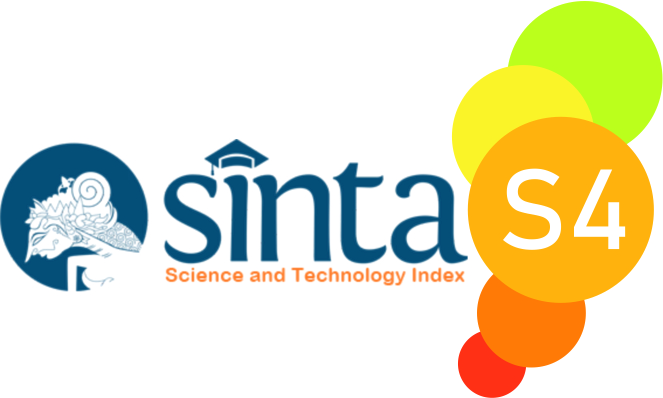THE EFFECTIVENESS OF ROLE-PLAY TOWARDS VOCATIONAL SCHOOL STUDENTS’ SPEAKING SKILL
Abstract
This study aimed at investigating the effectiveness of using role-play toward speaking skills in learning English at the Class X students of SMKS Muhammadiyah Pangkalan Bun. Quasi-experimental research was administered in this study, using two groups of experimental and control. Multimedia 1 class as the experimental group and Multimedia 2 class as the control group. There were six meetings for each group with four meetings for treatment, and the other two meetings for pre-test and post-test. The data were in form of speaking scores emphasizing fluency, structure, and bravery. From the t-test for independent samples, the result showed that the value of the t-test was 0.034 less than 0.05. It means that the result of posttest scores in experimental and control groups are significantly different. Then, from the comparison of the means between pretest and posttest of experimental and control groups, the experimental group’s mean outperformed the control group in 2.20. It means that role play is effective in speaking skills in learning English. Furthermore, this study also showed that role play could create a communicative atmosphere in the classroom.
References
Brown, G., Yule, G., & McKelvie, N. (1986). Teaching the Spoken Language. RELC Journal, 17(1), 97–99. https://doi.org/10.1177/003368828601700108.
Florente, I., L. (2019). Role Play Grading Rubric. Online, https://idoc.pub/documents/role-play-grading-rubric-2nv8pw5oxolk, retrieved May 2020.
Hamdani. (2011). Strategi Belajar Mengajar. Bandung: Pustaka Setia.
Jackson, V.A., & Back, A.L. (2011). Teaching communication skills using role-play: an experience-based guide for educators. J Palliat Med, 14(6): 775‐780. Online, doi:10.1089/jpm.2010.0493, retrieved on May 2020.
Jones, R. (2001). A Consciousness- Raising Approach to the Teaching of Conversational Storytelling Skills. ELT Journal, 55(2), Pp: 155-169.
Kumaran, S., R. (2017). Benefits and Shortcomings of Role-Play as a Speaking Activity in English Language Classrooms, The English Teacher. Online, https://journals.melta.org.my/index.php/tet/article/view/273, retrieved on May 2020.
Liu, X. (2010). Arousing the College Students’ Motivation in Speaking English through Role-Play. International Education Studies, 3(1), Online, http://www.ccsenet.org/journal/index.php/ies/article/view/4974, retrieved at May 2020.
Munandar, A., Sukirlan, M., and Suka, R. G. (2013). The Use of Role Play Technique in Improving Students’ Speaking Ability. U-JET, 2(9), Online, http://jurnal.goretanpena.com/index.php/JSSR/article/view/99/0, retrieved at May 2020.
Phuetphon, P., Chayanuvat, A., & Sitthitikul, P. (2012). Using unscripted role play to improve speaking ability of Thai EFL students. Proceedings-Teaching Techniques-006 4th International Conference on Humanities and Social Sciences, Faculty of Liberal Arts, Prince of Songkla University, Hatyai, Thailand, Online, accessed on May 2020.
Wahab, A.A. (2009). Konsep Dasar IPS. Jakarta: Universitas Terbuka.

Journey: Journal of English Language and Pedagogy by http://ejurnal.budiutomomalang.ac.id/index.php/journey/index is licensed under a Creative Commons Attribution-ShareAlike 4.0 International License.






